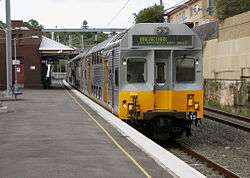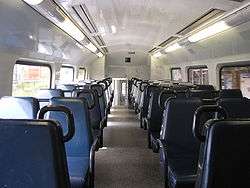Sydney Trains C set
| C Set | |
|---|---|
|
C Set at Bardwell Park station | |
|
Upper deck after Citydecker refurbishment | |
| In service | 1986-present |
| Manufacturer | A Goninan & Co |
| Built at | Broadmeadow |
| Constructed | 1986/87 |
| Refurbishment | late 1990s |
| Number built | 56 carriages |
| Formation | 4 car sets |
| Fleet numbers | C3581-C3608, T4247-T4274 |
| Capacity | 104 in power cars, 115 in trailer cars |
| Operator(s) | Sydney Trains |
| Depot(s) | Flemington |
| Line(s) served |
T2 Airport & South T3 Bankstown T5 Cumberand T6 Carlingford T7 Olympic |
| Specifications | |
| Car length | 20.39 m (66 ft 11 in) |
| Width | 3.04 m (10 ft 0 in) |
| Height | 4.37 m (14 ft 4 in) |
| Weight | 52 t (51 long tons; 57 short tons) |
| Track gauge | 1,435 mm (4 ft 8 1⁄2 in) |
The C sets are a class of electric multiple unit train operated by Sydney Trains in New South Wales, Australia. The carriages are of stainless steel, double deck construction.
Design & construction
The C sets were a follow-on from the K sets. They were built as an interim measure due to the lateness of the Tangara program. They were the first Sydney suburban trains to be fitted with chopper control, which gives the train smoother acceleration. Gate turn-off thyristors were used to control power to the traction motors, hence allowing for smoother acceleration.[1] Following the success of the implementation of chopper control, these features were later installed on the Tangara and later V set carriages.
The C set carriages were also the first on the suburban network to feature fixed seating (originally covered with fabric, since replaced with vinyl).[1] This proved to be unpopular, but nevertheless, fixed seating was later used on the suburban Tangara cars. These cars also featured push-button doors requiring passengers to activate, to increase air-conditioning efficiency. These proved unpopular and the push-buttons on the doors were removed.
The C set is distinguished externally by a fibreglass molding mounted on the front of the power carriage. It was originally in the State Rail Authority white with orange and red candy livery stripes on the lower portion. C3596 was the only power car to have its Candy-liveried front repainted in CityRail blue and yellow prior to its Citydecker refurbishment in 1998. The chopper cars are amongst the heaviest in the suburban fleet, with the power cars weighing 52 tonnes.
The order was for 56 cars:
- Power cars - C3581-C3608
- Trailer cars - T4247-T4274
In service
The first set entered service in July 1986 operating out of Mortdale Maintenance Depot,[1] some were delivered to Hornsby Maintenance Depot, but by December 1988 all were operating out of Punchbowl Maintenance Depot as sets K40-K51.[2]
The chopper cars were originally targeted as K sets and for a while when they entered service, they ran together with the then-force ventilated K sets. This however caused problems in service as force-ventilated cars were fitted with camshaft control and led to jerking while accelerating. By December 1990 they had been retargeted as C42-C54.[3] In January 1991 these were reformed as 6-car sets numbered C1-C8.[3] By June 1991 all had been transferred to Hornsby Maintenance Depot.[4]
During the late 1990s all were refurbished by A Goninan & Co as part of the CityDecker program. This saw the interiors refurbished with white walls and ceilings, grey floors and blue seats. Power cars received a destination indicator and had the yellow apron livery applied which includes a grey front with yellow over the bottom half.
In 2001, the C sets were once again reformed into seven 8-car sets. A 6-car C Set was re-formed in late 2006 due to car T4262 being seriously damaged by an arson attack at Villawood in October 2006, however the full 8-car set is now back in operation.
As at February 2015, all C Sets operate out of Flemington Maintenance Depot on T2 Airport & South, T3 Bankstown, T5 Cumberland, T6 Carlingford and T7 Olympic line services.
References
Further reading
- Beckhaus, John; Halgren, Stephen (2007), Sydney's Electric Trains, Australian Railway Historical Society, NSW Division, ISBN 978-0-9757870-8-3
External links
-
 Media related to New South Wales C sets at Wikimedia Commons
Media related to New South Wales C sets at Wikimedia Commons - Technical diagrams and specifications

